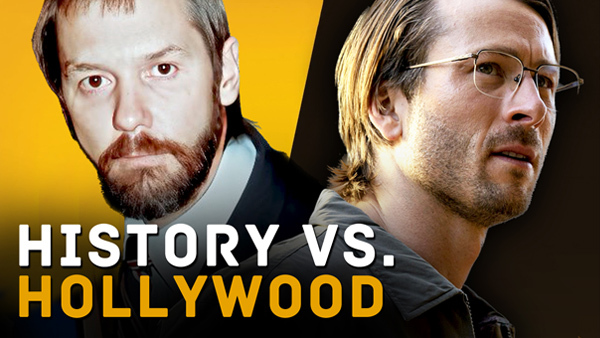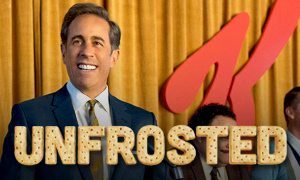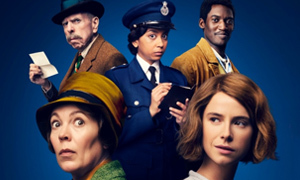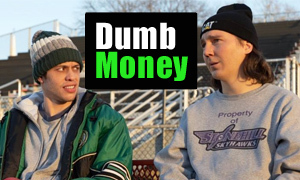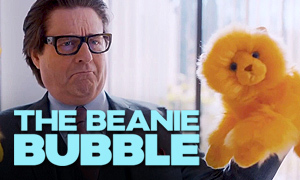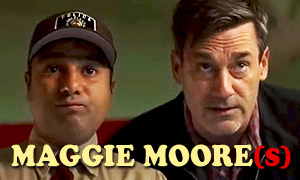"Dumb Money" vs. the True Story of the GameStop Stock Scandal
Paul Dano
Born: June 19, 1984
Birthplace:
New York City, New York, USA
Keith Gill
Born: June 8, 1986
Birthplace: Massachusetts, USA
Shailene Woodley
Born: November 15, 1991
Birthplace:
Simi Valley, California, USA
Caroline Gill
Birthplace: USA
Bio: Keith Gill's Wife
Pete Davidson
Born: November 16, 1993
Birthplace:
Staten Island, New York City, New York, USA
Kevin Gill
Born: December 14, 1989
Birthplace: Stoughton, Massachusetts, USA
Bio: Keith Gill's Brother
Vincent D'Onofrio
Born: June 30, 1959
Birthplace:
Brooklyn, New York City, New York, USA
Steve Cohen
Born: June 11, 1956
Birthplace: Great Neck, New York, USA
Bio: Hedge Fund Manager and Owner of New York Mets
Seth Rogen
Born: April 15, 1982
Birthplace:
Vancouver, British Columbia, Canada
Gabe Plotkin
Born: abt 1979
Birthplace: Portland, Maine, USA
Bio: Hedge Fund Manager (Melvin Capital)
Olivia Thirlby
Born: October 6, 1986
Birthplace:
New York City, New York, USA
Yaara Plotkin
Born: October 12, 1982
Birthplace: Queens, New York City, New York, USA
Bio: Gabe Plotkin's Wife
Nick Offerman
Born: June 26, 1970
Birthplace:
Joliet, Illinois, USA
Ken Griffin
Born: October 15, 1968
Birthplace: Daytona Beach, Florida, USA
Bio: Hedge Fund Manager (Citadel LLC)
Sebastian Stan
Born: August 13, 1982
Birthplace:
Constanta, Romania
Vlad Tenev
Born: February 13, 1987
Birthplace: Varna, Bulgaria
Bio: Co-Founder/CEO of Robinhood Stock Trading Company
Rushi Kota
Born: April 16, 1987
Birthplace:
Secunderabad, Andhra, India
Baiju Bhatt
Born: March 15, 1984
Birthplace: Virginia, USA
Bio: Co-Founder of Robinhood
What was the GameStop short squeeze?
To understand the Dumb Money movie and the semantics of the GameStop short squeeze, it's important to first understand what it means to short a stock (in this case GameStop). Due to the rise of video games being purchased digitally and people not going into retail stores as much during the COVID-19 pandemic, some people believed that GameStop was headed for a decline value. Then, in early January 2021, a change in leadership at GameStop caused the stock to rise somewhat, but the big hedge fund managers believed the optimism was overinflated and viewed it as the perfect time to short the stock. Basically, this means that an investor borrows the stock, sells it on the open market, waits for the price to fall, then buys it back at the lower price and pockets the difference after repaying interest on the initial loan (stock that they borrowed).
However, when Keith Gill (portrayed by Paul Dano in the GameStop stock scandal movie) helped to spark interest in the stock via YouTube and Reddit, specifically in the subreddit r/wallstreetbets, retail investors (individuals/nonprofessional investors) rallied around the stock, causing its value to soar. The big hedge funds that were anticipating the stock to fall (and had sold over 137% of the GameStop stock short) were now scrambling to buy it back at a higher value and suffer a loss in order to mitigate the damage, which in turn caused the GameStop stock to rise even more. When this happens, it is known as a short squeeze.
Many of the big hedge funds could have avoided the damage if they had bought the stock back earlier, but they held on to the stock since they believed the company was headed for bankruptcy.
Is Pete Davidson's character, Kevin Gill, a real person?
Yes. As indicated in the Dumb Money cast vs. real people section above, Keith Gill indeed has a brother named Kevin Gill. In a Facebook post at the time of the market rally around GameStop, Kevin commented, "Um yeah. So my brother is kinda famous now."
Was Keith Gill working as a financial analyst at the time of the GameStop short squeeze?
Gill had been the first in his family to graduate from a four-year college, earning a degree from Stonehill College in Massachusetts. A track and field star in college, he graduated in 2009 during the financial crisis and struggled to find permanent employment. Just prior to gaining widespread notoriety and making millions during the GameStop short squeeze, Gill had been working in "a marketing and financial education" position at the large insurance company MassMutual, a job that he'd held since 2019. "My job was to help develop financial education classes that advisors could present to prospective clients," he told the U.S. House Committee on Financial Services. "I was not a stock broker or a financial advisor. I did not talk to clients, and I did not recommend stocks for them to buy. Before and after I joined MassMutual, I studied and followed stocks. One of those was GameStop."
According to Reuters, MassMutual released a statement at the end of January 2021 stating that Gill was no longer employed by them.
Was Keith Gill married with a child at the time of the GameStop short squeeze?
Yes. Keith Gill had married his wife Caroline in 2016. A Dumb Money fact-check confirms that like in director Craig Gillespe's movie, they had a 2-year-old daughter at the time of the GameStop market rally that Keith helped facilitate. He did so through analysis he presented in videos on his Roaring Kitty YouTube channel and posts on Reddit's WallStreetBets subreddit under the user handle "DeepF***ingValue".
Did Keith Gill's sister die the year before the GameStop stock scandal?
Yes. Keith told the U.S. House Committee on Financial Services, "We had an incredibly difficult 2020; most difficult was the tragic and unexpected loss of my sister Sarah in June. I am grateful to be in a position to give back to, and support, my family." Keith's sister Sarah left behind three children, who, according to the Daily Mail, were taken in by their grandparents (Keith's parents).
How big did GameStop trading become?
In researching the question, "How accurate is Dumb Money?" we learned that by January 26, 2021, GameStop had become the single most traded stock in the U.S. stock market, with volumes equal to the five biggest tech companies combined. A ColdFusion documentary pointed out that GameStop's share price had risen from just a few bucks in 2020 to a peak of more than $400. The company, which had been valued at 200 million in April 2020, was now worth more than $28 billion.
Was the r/wallstreetbets subreddit banned during the GameStop frenzy?
To be exact, the subreddit r/wallstreetbets' Discord forum was banned on January 27, 2021. The company claimed that users had violated their policies on hate speech, an infraction that most users believe is far from the actual reason the board was blocked.
"The folks who did that said, 'Oh, it was to ban hate speech.' It was not to ban hate speech," said political commentator Ben Shapiro during his analysis of the GameStop short squeeze. "It was not to ban violent speech. It was specifically done in order to undercut the market for GameStop stock. It was deliberately done in order to create a sellable market, so people would start selling their stock immediately and the price would go back down and people would stop getting screwed over in [the big hedge fund] world." Basically, if all of the Redditors who bought the stock could no longer communicate with each other and "hold the line" together, they would start to sell, which is in part what began to happen. Discord reversed their decision the following day.
While researching the Dumb Money true story, we discovered that moderators of the subreddit r/wallstreetbets had also momentarily made the subreddit private, claiming that, despite the help of bots, they were having trouble keeping up with moderating the posts, given the increased number of users. The subreddit was set to private for about an hour on the evening of January 27, 2021. According to the ColdFusion documentary, Facebook then stepped in and shut down the Robinhood trading group, which had over 157,000 members, citing policy violations and claiming it had nothing to do with the stock price surges.
During the GameStop stock buying frenzy, did Robinhood halt buying?
Yes. Like in the GameStop stock scandal movie Dumb Money, the stock trading platform Robinhood faced heavy criticism and class-action lawsuits for temporarily halting the buying of GameStop stock and other securities on January 28, 2021. Robinhood wasn't the only brokerage firm to halt buying and only allow selling of GameStop. Several others took the same action, claiming they restricted buying because the clearing houses had raised the required collateral for executing trades and it would take time to provide the increased collateral to the clearing houses. According to them, more collateral was required because the large trading volumes in certain stocks, including GameStop, "generated substantial risk exposures at firms that clear these trades [...] particularly if the clearing member or its clients are predominantly on one side of the market" (Financial Times).
Traders were outraged over the actions of Robinhood and the other brokerage firms that halted trading, believing the firms were manipulating the market and bending to the big hedge funds that were losing billions. As CNN noted at the time, the restrictions put on the stock by brokerage firms contributed to a drop in the value of the stock price. GameStop declined substantially on February 1 and 2, 2021. Robinhood was also accused of selling users' shares without permission. While conducting our Dumb Money fact-check, we learned that the firms faced criticism from politicians and notable businesspeople on both sides of the political aisle. As noted by The Washington Post, it was also revealed at the time that Robinhood had a relationship with Citadel and other large investment firms, which could have added to their incentive to halt buying.
Was GameStop the only company that the Redditors focused on?
No. Reddit's WallStreetBets group noticed that other companies were being heavily shorted as well, including Nokia, AMC Theaters, BlackBerry, iRobot Corporation, and a number of others. They made coordinated attacks to elevate those stock prices as well. -ColdFusion
Are the small-time investors in the movie based on real people?
For the most part, no. Other than being very loosely inspired by the real-life people who were following Keith Gill's Reddit and YouTube posts, the small-time investors (aka "Dumb Money") in the GameStop stock movie are fictional. This includes the nurse, Jenny Campbell (America Ferrera); the GameStop employee, Marcus Barcia (Anthony Ramos); and college students Harmony Williams (Talia Ryder) and Riri (Myha'la Herrold).
America Ferrera's character, Jenny Campbell, was loosely inspired by Kim Campbell, the nurse in Ben Mezrich's book, but we found no evidence the character in the book is based on a real person. "Jenny is sort of a conglomerate of a number of characters in the world and also in the book that the script is based on," said Ferrera (FilMonger).
How much did Keith Gill make on his initial investment in GameStop stock?
While exploring the Dumb Money fact vs. fiction, we discovered that Massachusetts native Keith Gill (portrayed by Paul Dano), who posted in the subreddit r/wallstreetbets, turned a $53,000 investment in 2019 into one that peaked at $48 million during the rally. Though the GameStop stock fluctuated wildly, Gill still made tens of millions in the end, while hedge funds that were short GameStop when the chaos began lost tens of billions. By January 28, 2021, the hedge funds and short sellers had lost $70 billion. In all, approximately 5,000 U.S. firms had been affected. -ColdFusion
Did Keith Gill draw the attention of the Securities and Exchange Commission and various government officials?
Yes. Gill and the GameStop short squeeze drew the attention of lawmakers and the Securities and Exchange Commission (SEC), which oversees the stock market. On February 18, 2021, Gill testified before the U.S. House Financial Services Committee during a virtual hearing. "I did not solicit anyone to buy or sell the stock for my own profit," he stated, telling the committee that he simply liked the stock and believed that it had been undervalued, citing two main factors for his reasoning. The first was that he believed the market was "underestimating the prospects of GameStop's legacy business and overestimating the likelihood of bankruptcy." The other was that he felt that GameStop could create new revenue streams by pivoting into the digital realm as a "technology-driven business" that embraced the digital economy.
Were the Redditors the only ones who made money, or did some Wall Street titans cash in on the squeeze too?
While many people believe that the little guy beat out the Wall Street titans, the true story reveals that wasn't exactly the case. Larger trading professionals joined the rally as well and grabbed up GameStop stock while it was soaring in value and then sold it days later. Black Rock and eight other Wall Street giants made a combined total of $16 billion on the GameStop short squeeze.
What drew director Craig Gillespie to the project?
"During COVID, one of my sons, my youngest son, who was 24 at the time, was living with us, like a lot of people," said Gillespie, "and he was involved in the WallStreetBets, and all the way through, from very early on. So I was living with him, and it got, obviously, very intense during that two-week period, trying to time the options, and that intensity, like, literally every three minutes, trying to figure out when to sell, when to get out. Just all the conversations happening online, and then the frustration with the crash, with Robinhood, with the freeze, with WallStreetBets being shut down, the outrage that was happening online, I got to see it all firsthand through his eyes, so that was my touchstone as I was making this movie. Seeing just how intense this situation was, and the stakes that were involved for so many people, that's what drew me to the project." -LRM Online
Director Craig Gillespie said that his son "did really well" on the GameStop short squeeze. "He got out right at the right time." As for himself, he said that he "timed it perfectly wrong."
